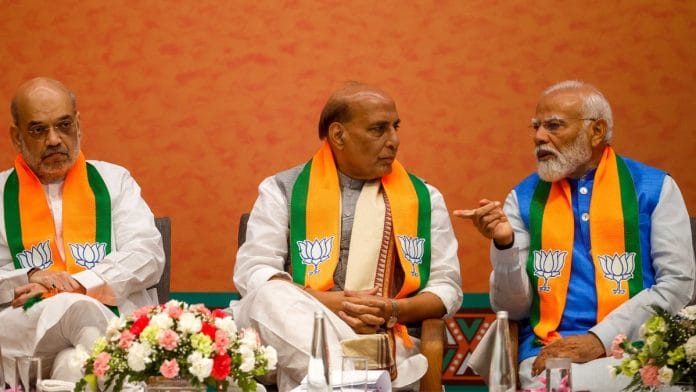The Delhi Assembly election results are out. The BJP has received a clear thumbs-up from voters. But the past month’s debate on social policy should make us pause—India will keep losing as long as public discourse stays stuck in the binary of “my welfare is welfare, your welfare is a freebie” imposed by political parties.
Let’s begin by assessing the social sector spending in the 2025 Union budget, presented four days before the Delhi polls. As is now well-documented, overall allocations to health, education, and social protection have not budged much from last year. However, one particular component of social protection has seen a 24 per cent increase in allocation—the Pradhan Mantri Arogya Yojana (PMJAY). As per research, PMJAY has been more productive in promoting healthcare privatisation than improving the quality or utilisation.
The ruling establishment’s message is clear: social policy is a matter of permanent negotiation with the less well-off – to be adjusted according to the prevailing balance of electoral forces – rather than a tool that needs continuous innovation and updating. In the present context, middle-class demands for tax breaks took precedence given the middle-class-heavy composition of the Delhi electorate.
In a widely read 2020 essay, economists, Arvind Subramanian and Abhishek Anand, were the first to point to the Narendra Modi government’s so-called “new welfarism”. This approach entailed that social policy should be limited to subsidising the consumption of essential goods and services typically provided by the private sector—toilets, cooking gas, housing, etc. It is instructive to note that several of the schemes under “new welfarism,” in fact, originated on a smaller scale in the UPA years. For example, the antecedents of the Ujjwala scheme are in the Rajiv Gandhi Gramin LPG Vitaran Yojana.
However, the UPA years also saw attempts to construct a rights-based discourse around social policy, best exemplified by the passage of the Mahatma Gandhi National Rural Employment Guarantee Act (MGNREGA). The “new” in the “new welfarism” was to elevate subsidies for the consumption of essential private goods as the raison d’etre for social policy. The role of social policy became purely defensive, namely, to help pull up those who had recently fallen below the poverty line back to subsistence levels by smoothening consumption gaps. Any attempt to think beyond this scope was akin to encouraging freebies. Indeed, this was the crux of Prime Minister Narendra Modi’s famous remark about the “revdi culture” of opposition parties. The target was the Aam Admi Party (AAP) welfare model, structured around programmes like free Mohalla clinics, which gained traction among voters before the 2022 assembly elections in Gujarat and Himachal Pradesh.
Also read: Don’t misdiagnose AAP defeat in Delhi election results. It will be fatal to democracy
Scope of social policy
Criticisms of new welfarism typically take the following form: it reflects the government’s pro-big business orientation, which is why it has no issues handing out loan write-offs to corporations while placing limits on transfers to the poor. Such criticisms ring hollow for two reasons. First, as the political scientist Atul Kohli has astutely observed, all governments post-1980 have pursued pro-big business policies. From this perspective, what is surprising is that post-1991 governments, arguably committed to pro-market policies, have continued distorting markets to favour big business, just like their predecessors. Second, and more importantly, these criticisms end up tacitly accepting new welfarism’s basic premise by making social policy’s legitimacy conditional: if corporate welfare is acceptable, then so is social welfare.
Both the government and its critics get the scope of social policy wrong. Treating it as merely a tool to smoothen present consumption gaps for the newly poor ignores something fundamental about the nature of work in the modern world. As R. Jagannathan, editorial director of Swarajya magazine, recently pointed out, the future of work in India is precarious, given the rapid strides made by generative AI.
Under the circumstances, limiting social policy to the newly poor is a disservice to today’s poorest of the poor who benefit little from the new welfarism. It is also a disservice to today’s non-poor who may fall into hard times tomorrow because of the bleak future of work per se. Hence, a social policy that is in sync with the rhythm of modern capitalism has to be expansive and encompassing.
As the Cornell University researchers, Andaleeb Rahman and Prabhu Pingali, argue in their recent book, The Future of India’s Social Safety Nets, a social policy fit for an era of increasingly frequent capitalist crises must offer a menu of social assistance to citizens to promote development resilience. In other words, both Ujjwala and Mohalla clinics can work seamlessly as parts of the same dynamically evolving social policy toolkit.
Subhasish Ray is Professor and Associate Dean at the Jindal School of Government & Public Policy, O.P. Jindal Global University, Haryana; and an editor for the Journal of Genocide Research. He tweets @subhasish_ray75. Views are personal.
(Edited by Ratan Priya)






